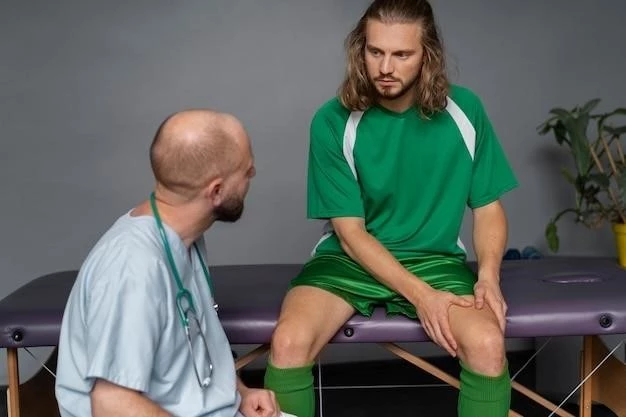Introduction to Merosin-positive Congenital Muscular Dystrophy
Merosin-positive congenital muscular dystrophy presents a range of clinical manifestations and complexities, impacting various aspects such as cognition, mobility, and muscle function. Stay informed with the latest research and developments.
Merosin-positive congenital muscular dystrophy is a subtype classified based on the presence of merosin, an extracellular matrix protein crucial for muscle fiber stability. This condition presents with a range of symptoms affecting muscle strength and function, often leading to challenges in mobility and daily activities.
Definition and Overview
Merosin-positive congenital muscular dystrophy is characterized by the presence of merosin, a crucial muscle protein linked to various clinical manifestations impacting patients’ muscle function and mobility.
Historical Classification
Historically, congenital muscular dystrophies were broadly categorized into Classic CMD, encompassing Merosin-deficient CMD and Merosin-positive CMD, and CMD with central nervous system abnormalities. The understanding of these classifications has evolved with advancements in genetic research and diagnostic approaches.
Modern Genetic Classification
In modern times, congenital muscular dystrophies are classified based on genetic defects. This approach allows for a more precise categorization of subtypes, including the distinction between merosin-deficient and merosin-positive forms, aiding in personalized treatment strategies and research advancements.
Characteristics of Merosin-Positive Congenital Muscular Dystrophy
Merosin-positive congenital muscular dystrophy presents a spectrum of clinical features, including muscle weakness, contractures, and cognitive impairment, with varied severity and impact on daily function.
Clinical Symptoms and Manifestations
Merosin-positive congenital muscular dystrophy is characterized by a range of symptoms, including muscle weakness, contractures, cognitive impairments, and motor delays. These clinical manifestations vary in severity and may impact daily function and quality of life.
Diagnostic Criteria
Diagnosing merosin-positive congenital muscular dystrophy involves evaluating clinical symptoms, conducting genetic testing to identify mutations in the LAMA2 gene, and utilizing imaging studies to assess muscle structure and function, aiding in accurate diagnosis and treatment planning.
Genetic Basis of Merosin-Positive Congenital Muscular Dystrophy
Merosin-positive congenital muscular dystrophy is linked to mutations in the LAMA2 gene, affecting muscle stability and function.
Mutations in the LAMA2 Gene
Genetic mutations in the LAMA2 gene are associated with merosin-positive congenital muscular dystrophy, impacting muscle stability and function.
Impact of Gene Mutations on Protein Function
Mutations in the LAMA2 gene affect the function of merosin, an essential protein for muscle stability and integrity, leading to the manifestation of merosin-positive congenital muscular dystrophy.
Evaluating clinical symptoms, genetic testing for LAMA2 mutations, and using imaging studies aid in accurate diagnosis and treatment planning.
Imaging Studies and Biomarker Analysis
Diagnosing merosin-positive congenital muscular dystrophy involves utilizing imaging studies to assess muscle structure and function, as well as biomarker analysis to aid in accurate diagnosis and treatment planning.
Diagnostic Approaches for Merosin-Positive Congenital Muscular Dystrophy
Diagnosing merosin-positive congenital muscular dystrophy involves a comprehensive approach, including clinical evaluations, genetic testing for LAMA2 mutations, imaging studies, and biomarker analysis to ensure accurate diagnosis and appropriate treatment.
Treatment Strategies for Merosin-Positive Congenital Muscular Dystrophy
Treatment for merosin-positive congenital muscular dystrophy focuses on managing symptoms, maximizing function, and improving quality of life through physical therapy, orthopedic interventions, and assistive devices.
Current Therapeutic Interventions
Current therapeutic interventions for merosin-positive congenital muscular dystrophy focus on symptom management, mobility enhancement, and supportive care through a multidisciplinary approach, including physical therapy and orthopedic interventions.
Research Advances and Future Directions
Recent developments in research for merosin-positive congenital muscular dystrophy focus on potential therapeutic targets, gene therapy approaches, and precision medicine techniques to improve outcomes and quality of life for affected individuals.
Prognosis and Management of Merosin-Positive Congenital Muscular Dystrophy
Merosin-positive congenital muscular dystrophy poses challenges in mobility and cognitive function, requiring comprehensive care and support.
Long-Term Outlook and Quality of Life
The long-term outlook for individuals with merosin-positive congenital muscular dystrophy varies, impacting mobility, cognitive function, and overall quality of life. Management strategies aim to enhance well-being and functional independence.
Multidisciplinary Care Approaches
Effective management of merosin-positive congenital muscular dystrophy requires a multidisciplinary approach involving healthcare professionals specializing in neurology, orthopedics, physical therapy, and psychosocial support to address the complex needs of patients and optimize their overall well-being.

Impact of Merosin-Positive Congenital Muscular Dystrophy on Patients and Families
Merosin-positive congenital muscular dystrophy significantly affects patients’ mobility, cognitive function, and overall quality of life, requiring comprehensive care and support from their families.
Psychological and Social Challenges
Individuals with merosin-positive congenital muscular dystrophy face psychological and social challenges, requiring tailored support and interventions to address emotional well-being and social integration.
Support Networks and Resources
Accessing support networks and resources is crucial for families affected by merosin-positive congenital muscular dystrophy, providing assistance, guidance, and community connections to navigate challenges and enhance the quality of care and life.
Research Studies and Clinical Trials Related to Merosin-Positive Congenital Muscular Dystrophy
Ongoing research and clinical trials are exploring innovative treatment options and potential gene therapies for individuals with merosin-positive congenital muscular dystrophy, aiming to improve patient outcomes and quality of life.
Promising Developments in Treatment Options
Ongoing research and clinical trials are exploring innovative treatment options such as gene therapy and therapeutic targets to enhance outcomes for individuals with merosin-positive congenital muscular dystrophy.
Collaboration with Patient Communities
Based on the Internet data presented today, classic merosin-positive congenital muscular dystrophy (CMD) is a subgroup of disorders characterized by early onset, muscle weakness, joint contractures, and cognitive involvement. The disease affects mobility, muscle integrity, and cognitive functions, necessitating a comprehensive multidisciplinary approach for management and care. Families and patients face psychological and social challenges, emphasizing the importance of tailored support and community resources to enhance well-being. Ongoing research and clinical trials focus on innovative treatment options, including gene therapies, aiming to improve outcomes for individuals with this condition.
Merosin-positive congenital muscular dystrophy is a heterogeneous disorder with varying clinical presentations and severity, impacting patients globally.
Epidemiology and Global Burden of Merosin-Positive Congenital Muscular Dystrophy
Merosin-positive congenital muscular dystrophy showcases prevalence variances across different geographical regions, emphasizing the global impact of the condition;
Societal Implications and Healthcare Challenges
Merosin-positive congenital muscular dystrophy presents various societal implications and healthcare challenges, requiring comprehensive support systems and specialized medical care to address the complex needs of individuals and families affected by the condition.
Evolution of Understanding and Terminology in Merosin-Positive Congenital Muscular Dystrophy
Over time, the terminology and understanding of merosin-positive congenital muscular dystrophy have evolved, reflecting advancements in genetic classifications and diagnostic approaches to better characterize and address this complex condition.
Historical Perspectives and Nomenclature Changes
Throughout history, the understanding and terminology of merosin-positive congenital muscular dystrophy have evolved alongside advancements in genetic classifications and diagnostic methodologies to provide a more precise characterization and management of this complex condition.
Shifts in Diagnostic Criteria and Disease Definitions
The diagnostic criteria and definitions of merosin-positive congenital muscular dystrophy have undergone changes over time to better refine the understanding and classification of this condition, adapting to advancements in genetic and diagnostic technologies.

Conclusion⁚ Advances in Research and Care for Individuals with Merosin-Positive Congenital Muscular Dystrophy
The management of merosin-positive congenital muscular dystrophy has evolved with advancements in genetic classifications and diagnostic tools, aiming to optimize treatment strategies and enhance the quality of care provided to affected individuals. Ongoing research endeavors and clinical trials continue to explore innovative treatment approaches, reflecting a dedication to improving outcomes and quality of life for individuals living with this complex condition.
